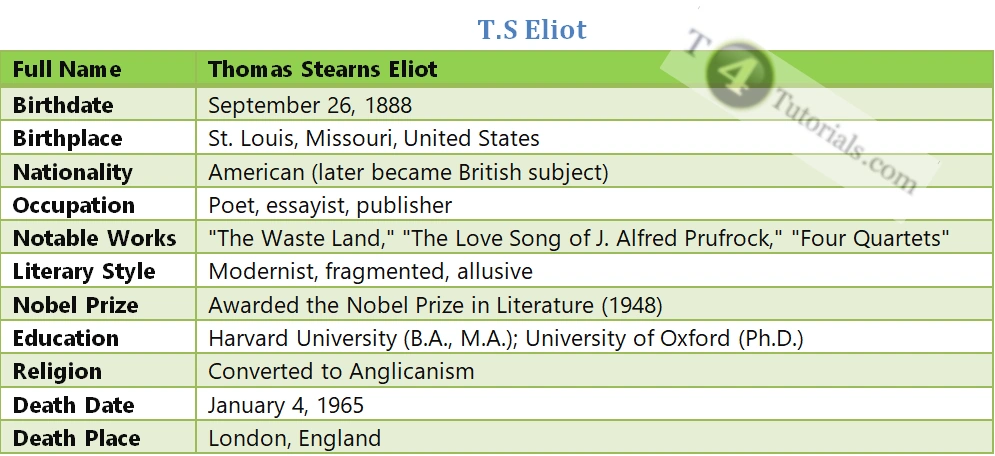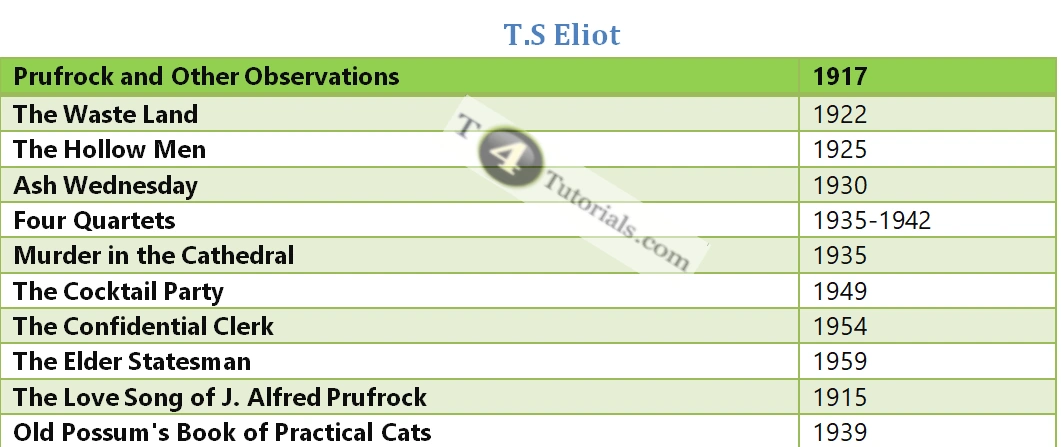30
Score: 0
Attempted: 0/30
Subscribe


T.S Eliot Basic info
| Full Name | Thomas Stearns Eliot |
| Birthdate | September 26, 1888 |
| Birthplace | St. Louis, Missouri, United States |
| Nationality | American (later became British subject) |
| Occupation | Poet, essayist, publisher |
| Notable Works | “The Waste Land,” “The Love Song of J. Alfred Prufrock,” “Four Quartets” |
| Literary Style | Modernist, fragmented, allusive |
| Nobel Prize | Awarded the Nobel Prize in Literature (1948) |
| Education | Harvard University (B.A., M.A.); University of Oxford (Ph.D.) |
| Religion | Converted to Anglicanism |
| Death Date | January 4, 1965 |
| Death Place | London, England |
T.S Eliot books names
| Prufrock and Other Observations | 1917 |
| The Waste Land | 1922 |
| The Hollow Men | 1925 |
| Ash Wednesday | 1930 |
| Four Quartets | 1935-1942 |
| Murder in the Cathedral | 1935 |
| The Cocktail Party | 1949 |
| The Confidential Clerk | 1954 |
| The Elder Statesman | 1959 |
| The Love Song of J. Alfred Prufrock | 1915 |
| Old Possum’s Book of Practical Cats | 1939 |
MCQs from famous poems of T.S Eliot
- MCQs – The Love Song of J. Alfred Prufrock
- MCQs – The Waste Land
- MCQs – The Hollow Men
- MCQs – Ash Wednesday
- MCQs – Gerontion
- MCQs – Journey of the Magi
- MCQs – Marina
- MCQs – Rhapsody on a Windy Night
- MCQs – Preludes
- MCQs – A Song for Simeon
Famous English Authors MCQs
- William Wordsworth MCQs
- William Shakespeare MCQs
- Robert Browning MCQs
- W B Yeats MCQs
- Edmund Spenser MCQs
- Chaucer MCQs
- John Milton MCQs
- S T Coleridge MCQs
- Lord Byron MCQs
- PB Shelley MCQs
- John Dryden MCQs
- John Keats MCQs
- Charles Dicken MCQs
- Alfred Lord Tennyson MCQs
- Charles Lamb MCQs
- D.H Lawrence MCQs
- Thomas Hardy MCQs
- Matthew Arnold MCQs
- John Galsworthy MCQs
- George Bernard Shaw MCQs
- T.S Eliot MCQs
- Ben Jonson MCQs
- Francis Bacon MCQs
- Alexander Pope MCQs
- Oliver Goldsmith MCQs
- Joseph Addison MCQs
- Dr Samuel Johnson MCQs
- Henry Fielding MCQs
- Sir Walter Scott MCQs
- Jane Austen MCQs
- Dr. Samuel Johnson MCQs
- English Comedy MCQs (Oliver Goldsmith)
- Alexander Pope MCQs (Neo-Classical Age of English Poetry)
- Daniel Defoe MCQs
- Dr. Jonathan Swift MCQs
- Richard Steele MCQs
- English Drama MCQs
- Elizabethan Drama MCQs [14th to 17th century]
- Elizabethan Prose MCQs
More English Literature MCQs
- English Poetry MCQs
- History of English Literature MCQs
- Sentimental Novels MCQs
- Sentimental Poetry MCQs
- Legends Of English Literature MCQs
- English Literature Quiz
- English Literature Important Multiple Choice Questions Answers
- Sons And Lovers by D H Lawrence MCQs
- The Waste Land, A Poem by T. S. Eliot MCQs
- Drama Origin MCQs
- History of the Renaissance Period MCQs
- English Pros MCQs
- Non-Dramtic Poets Of The Elizabethan Age MCQs
- The Cavalier Poets of 17th-century MCQs
- Metaphysical Poets of 17th century MCQs
- Renaissance Period of 14th, 15th, and 16th centuries MCQs
- Puritan Poet MCQs
- Restoration Comedy by William Congreve & Wycherley MCQs
- Satire MCQs – Renaissance Period by John Dryden
- English Essayists MCQs
- Romantic Period of Romantic Poets MCQs
- English language MCQs
- English Humour MCQs [American Literature]
- Early Writers of American Literature MCQs
- History of American Literature MCQs
- American Prose MCQs [English Realism ]
- American English Critics
- New Englanders Authors MCQs
- MCQs on American Literature After Independence
- American Playwrights MCQs
- New American Poetry MCQs
- British English Critics MCQs
- Ancient English literature MCQs
- Important English Literature MCQs for Public Service Commission
- English Literature Repeated Important MCQs
- CSS English Literature MCQs
- History of Early Period MCQs
- The Anglo-Saxon period MCQs
- The Age of Chaucer in the Early Period MCQs
- The Anglo-Norman Period of French Writers MCQs
- Metrical Romances MCQ (Anglo-Saxon Period)
- Revival of Learning MCQs (1400-1550)
- Applied Linguistics MCQs
- Language Change MCQs